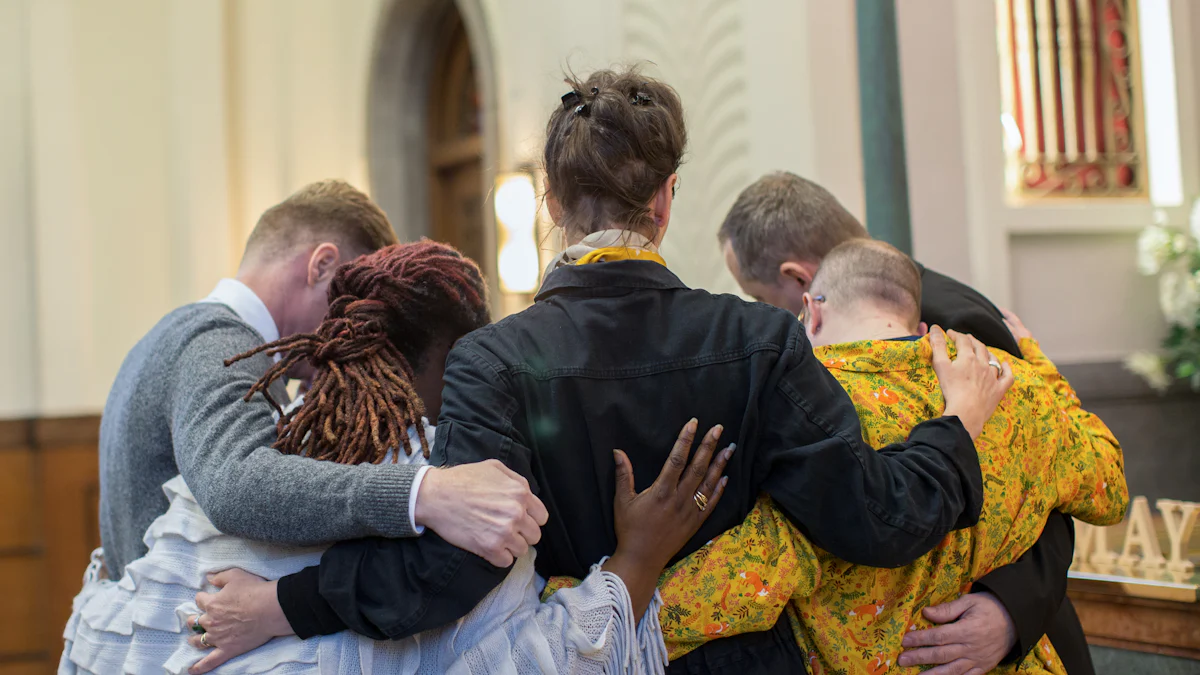Why Family Traditions Are Essential for Your Child's Emotional Well-Being

Family traditions create a foundation for emotional well-being. These rituals shape identity and provide children with a sense of belonging. Traditions offer stability and comfort, which help children navigate life's challenges. Research shows that children familiar with their family stories experience higher self-esteem and social competence. Traditions build resilience and are cherished memories in later years. Embrace these practices to foster a nurturing environment for your child's growth.
Understanding Family Traditions

Definition and Examples of Family Traditions
Family traditions create meaningful connections. These rituals often include holiday celebrations like Christmas, Hanukkah, and Diwali. Families gather for meals, decorations, and cultural rituals. Special days such as birthdays and name days also play a crucial role. These events shape identity and provide joy.
Personal stories highlight the impact of family traditions. Imagine gathering with relatives after Thanksgiving dinner to read books together. Picture the excitement of finding the Afikomen during Passover. These moments create cherished memories and teach valuable lessons.
Historical Significance of Family Traditions
Family traditions have evolved over time. Ancient customs transformed into modern practices. Each tradition carries the essence of cultural identity. Families pass down these rituals through generations. This continuity strengthens bonds and preserves heritage.
Traditions connect individuals to their roots. Celebrations remind children of their family's history. These rituals instill pride and belonging. Children learn about their ancestors and cultural values. Family traditions become a bridge to the past and a guide for the future.
Benefits of Family Traditions for Emotional Well-Being

Providing Routine and Consistency
Family traditions create a reliable routine for children. Predictable patterns help children feel secure. Regular family dinners or weekend activities offer stability. Children thrive when they know what to expect. Routines support emotional growth and development.
Traditions like Sunday brunches or annual vacations provide consistency. These rituals anchor children in a world that often changes. Familiar activities reduce anxiety and build confidence. Children find comfort in these repeated experiences.
Enhancing Emotional Well-Being
Family traditions serve as a source of comfort and security. Celebrations and rituals remind children of love and connection. Special moments like baking cookies during holidays bring joy. These experiences foster happiness and mental well-being.
Research shows that children involved in family traditions experience better emotional health. Traditions boost self-esteem and social competence. Children feel valued and understood in these nurturing environments. Happiness grows from shared family experiences.
Strengthening Family Bonds
Family traditions strengthen bonds among family members. Activities like game nights or storytelling sessions bring families closer. Shared laughter and memories enhance relationships. Children feel a strong sense of belonging and trust.
Stories of families strengthened by traditions inspire others. A family that gathers for an annual reunion builds lasting connections. These traditions create a supportive network. Children learn the importance of unity and love.
Promoting a Sense of Identity and Belonging
How traditions help children understand their heritage
Family traditions offer children a window into their heritage. Celebrations and rituals reveal the stories of ancestors. Children learn about cultural values through these practices. Each tradition becomes a lesson in history and identity. Understanding roots helps children find their place in the world.
Special rituals and celebrations shape individual identity. Traditions provide a sense of continuity and connection. Children feel linked to something greater than themselves. This connection fosters a deep sense of belonging. Family traditions become a guiding force in life.
Traditions' role in building self-esteem
Family traditions play a crucial role in building self-esteem. Participation in these rituals boosts confidence. Children feel valued and important during family gatherings. Shared experiences create a supportive environment. This support nurtures emotional growth and resilience.
Research shows that knowledge of family stories enhances well-being. Children with strong family connections exhibit higher self-esteem. These children also show greater social competence. Family traditions contribute to fewer behavior problems. Embracing these rituals leads to a happier, healthier child.
How to Incorporate Family Traditions
Creating New Family Traditions
Creating new family traditions can enrich your family's life. These rituals offer opportunities for bonding and growth. You can start by identifying activities that resonate with your family's interests. Consider hobbies, cultural practices, or seasonal events. Choose activities that everyone enjoys.
Tips for starting new family rituals:
Start Small: Begin with simple activities. A weekly movie night or a monthly nature walk can become cherished traditions.
Be Consistent: Regularity helps traditions take root. Set a specific day or time for your chosen activity.
Celebrate Milestones: Use birthdays or anniversaries as opportunities to create new traditions. Special meals or outings can mark these occasions.
Involving children in the creation process:
Children thrive when they participate in creating family traditions. Encourage them to share ideas and preferences. This involvement fosters a sense of ownership and excitement. Children feel valued when their input shapes family rituals.
Ask for Suggestions: Invite children to suggest activities. Their creativity can lead to unique and enjoyable traditions.
Assign Roles: Give children responsibilities during family events. Tasks like setting the table or choosing a game can enhance their engagement.
Maintaining Existing Family Traditions
Maintaining existing family traditions requires adaptability. Modern lifestyles often present challenges. However, preserving these rituals strengthens family bonds and cultural identity.
Adapting traditions to modern lifestyles:
Families can modify traditions to fit contemporary schedules. Flexibility ensures that traditions remain relevant and enjoyable. Consider adjusting the timing or format of activities.
Embrace Technology: Use video calls for distant relatives during holiday celebrations. Virtual gatherings keep connections strong.
Simplify Rituals: Streamline complex traditions to accommodate busy lives. Focus on the core elements that hold meaning.
Overcoming challenges in preserving traditions:
Challenges may arise when maintaining family traditions. Commitment and creativity help overcome these obstacles. Families can find ways to keep traditions alive despite changes.
Prioritize Traditions: Make traditions a priority in your schedule. Set reminders and plan ahead to ensure participation.
Seek Support: Engage extended family members in preserving traditions. Shared efforts strengthen commitment and enjoyment.
Family traditions play a vital role in shaping identity and fostering emotional well-being. By creating and maintaining these rituals, families build lasting memories and connections. Embrace the opportunity to enrich your family's life through meaningful traditions.
Encouraging Family Traditions in Your Community
Sharing Family Traditions with Others
Family traditions enrich not only your family but also the community. Community events and celebrations offer a platform to share these traditions. Neighborhood gatherings or local festivals provide opportunities for families to showcase their unique customs. Families can participate in cultural fairs or holiday parades. These events allow families to introduce their traditions to others.
Cultural exchange benefits everyone involved. Learning about different family traditions broadens perspectives. Community members gain appreciation for diverse customs. Children learn respect and understanding for other cultures. Shared experiences build stronger community bonds. Families find joy in celebrating together.
"Do you have a favorite story your family tells when you get together during the holidays? Do you know what happened the day you were born, or how your parents met? Do your own children know these stories about themselves?" - Anonymous Contributor
Supporting Families in Tradition Building
Resources and support groups play a crucial role in tradition building. Families can access workshops or online forums. These platforms offer guidance on creating and maintaining family traditions. Families can share ideas and learn from each other's experiences. Support groups provide encouragement and inspiration.
Schools and community centers contribute significantly. Educational institutions can incorporate family traditions into their curriculum. Schools can organize cultural days or storytelling sessions. Community centers can host workshops or family nights. These initiatives foster a sense of belonging and identity.
"Family traditions give families their own patina, their own scent, their own unique texture. They could be once a year Christmas traditions, or things that only happen at birthdays or daily rituals that make breakfast just right." - Anonymous Contributor
Engaging in family traditions strengthens emotional well-being. Families create lasting memories through shared rituals. Community involvement enhances these experiences. Embrace the opportunity to share and support family traditions within your community.
Family traditions hold immense value for emotional well-being. These rituals create bonds and foster a sense of belonging. Embrace family traditions to build lasting memories.
Author: "I still appreciate this family tradition to this day and have since continued the sentiment with my own family."
Reflect on your own family traditions. Consider how these practices shape identity and provide comfort. Encourage your family to engage in meaningful rituals. Create a nurturing environment that supports growth and happiness.
See Also
The Significance of Establishing Family Routines for Resilient Children
The Vital Role of Emotional Regulation in Fostering Resilient Children
Strategies for Promoting Emotional Wellness in Children

